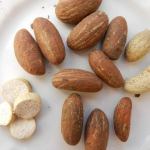Garcinia kola or Bitter kola or Namijin goro (Hausa) or orogbo (Yoruba) or Oji (Igbo): A plant that also has medicinal uses
Garcinia kola belongs to the family Guttiferae. It is a widespread tree of evergreen forest and it is found from the Democratic Republic of Congo to Ghana, where it occurs in the wet and moist semi deciduous forest zones as well as in the savannah. Garcinia kola is well branched, evergreen and grows as a medium size tree, reaching 12 m in height.
The specie is one of the most important trees valued in Nigeria for its medicinal seeds and its exploitation in the natural forests has been very heavy. The plant has been reported to have varying uses in folklore medicine. Probably because of its wide spread use in folklore medicine, Garcinia kola has been a subject of intense scientific investigations.
Bitter kola has been proven to exhibit pharmacological uses in treating coughs, throat infections, bronchitis, hepatitis and liver disorders. It serves as bitter stimulant and as snake repellent when they are placed round the compound. Other medicinal uses of this plant include purgative, anti-parasitic and antimicrobial. This plant has shown bronchodilator effect, anti-inflammatory, antibacterial and antiviral properties, anti-hepatotoxic effect and antioxidant activity.
In south west Nigeria, Garcinia kola is one of constituents of traditional recipe that is used in the management of sickle cell disease. The seeds of Garcinia kola are used in African traditional medicine for various therapeutic purposes based on pharmacological effects of the active components (flavonoids) in the seed and other parts of the plants.

Credit:Alibaba
The seed extracts have been shown to possess anti-inflammatory, anti-diabetic, antimicrobial and anti-hepatotoxic activities. The seed extracts have also been shown to inhibit the metabolism of certain drugs and to have and molluscicidal activity.
The ability of Garcinia kola to boost immunity among its other pharmacological activities is believed to be related to its anti-oxidative activity. The seeds of Garcinia kola have also been used traditionally to treat hepatitis and other viral infections such as those caused by influenza and Ebola viruses. It has also been used as antidote for ingested poison and for oral hygiene. Garcinia kola is readily available and freely consumed in traditional ceremonies in many part of the Nigeria. Just like coffee, many locals consume it to stay awake and brighten their mood.
It is generally believed, although it has not been proven, that Garcinia kola keeps people awake and can sustain muscle tone. It is also believed that G. kola contains caffeine and therefore may also affect learning and memory. Scientific studies have found levels of toxic substances, such as tannins, phytic and hydrocyanic acids to be very low and insignificant. The juice of the fruit and seeds of Garcinia kola are nutritive sources of substantial amount of vitamin C.
Scientific studies of Garcinia kola seeds have shown that they contain several chemical constituents that possess anti-hepatoxic effects, suggesting that Garcinia kola seeds could play a pharmacological role as a liver prophylaxis. These studies isolated a set of bioflavonoids that consistently exhibit potent antioxidant properties.
A group of compounds called racemates that are found in Garcinia kola inhibit liver lipid peroxidation (damage of fat in the liver by free radicals). With no toxic byproducts, infusions of Garcinia kola seeds are a useful adjuvant to the diet of those who consume compounds that interfere with liver metabolism, or who suffer liver disorders. It has been reported that the seeds, used as an herbal treatment for patients with liver disease, markedly improved liver function.
Recent analyses of nitrosatable amines in natural tropical stimulants like Cola acuminita, Cola nitida (a component of Coca Cola and other popular beverages), and Garcinia kola suggest that high levels of kola nut chewing promotes significant methylating activity. There is a possibility that this could prevent the development of cancer in humans in countries, where tropical nut stimulants are widely consumed.
However, Garcinia kola is not a stimulant like the two other Colas since it does not contain caffeine or related substances (indeed the trees are from different families) and show much lower levels of aliphatic amines than the other two. Garcinia kola has virtually no toxic effect; indeed it is safer than another tropical nut with a similar name Cola nitida, which is a component of colas of mass consumption. As a point of history, Cola nitida was selected for the Coca-Cola recipe from among a set of tropical flavouring candidates that include Garcinia kola, back in the 19th century.
These are the thoughts of:
Sa’eed Halilu Bawa
Senior Lecturer (Associate Professor) at University of the West Indies, St. Augustine Campus, Trinidad.
Studied Food and Nutrition Sciences, Dietetics at Kaduna Polytechnic, Nigeria; Warsaw University of Life Sciences, Poland.




























well i think this is a good lesson the bitter cola that is relevant to all of us